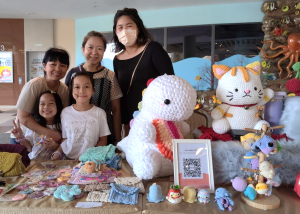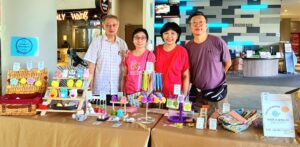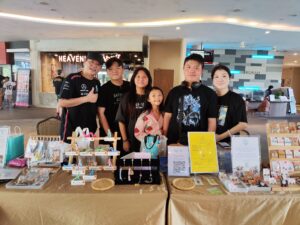
CAREwell Key Worker
CaringSG Limited is a charity led by caregivers to serve special needs caregivers and the community towards an inclusive and caring Singapore.

As we caregivers journey along with our special needs dependents, some of us may wish to start our own caregiver support group catering to our specific needs. However, some of us may not have much experience starting or running a support group. To empower caregivers who wish to start your own group, CaringSG interviewed Vivi Xie, a mother to a son diagnosed with autism.
Vivi did not know much about autism until her son was diagnosed when he was in preschool. She remembered he could call her ‘Mama’ when he was one year old, but stopped speaking after that. At two and a half years old, he still couldn’t speak, and would engage in repetitive actions. After speaking to her husband, they took their son for an assessment which confirmed he had autism.
He managed to get into an EIPIC Centre a few months later and received the intervention he needed. However, Vivi still felt lost as she was unable to find the information she was looking for in the vast sea of the internet. With a few friends who were special needs caregivers, she started the ASD, ADHD and ADD Supports Group Singapore on Facebook in 2017. It has grown to over 600 members today.
These are some tips we learnt from her about starting your own caregiver support group.
1. Find like-minded people to start the group with
Vivi started her group with friends who were special needs caregivers after learning they had similar issues with not knowing where to find the right information suitable for their own situation. They decided to pool their knowledge and resources in their ASD, ADHD and ADD Supports Group Singapore, and take turns moderating the group.

2. Invite fellow caregivers to join
When Vivi started her group, she also took a step out to share about her group with her friends, or when the opportunity arose. As word of mouth spread that her group existed, more members joined when they heard from their networks that there was a group for caregivers to learn more about ASD, ADHD and ADD.
Vivi shared that she realised there were many ‘invisible caregivers’, caregivers who journeyed alone without any support group or sharing about their dependent’s condition with anyone other than their family. She was glad that some of these caregivers heard about her group and joined to find the support they needed.
3. Set ground rules and moderate consistently
In ASD, ADHD and ADD Supports Group Singapore, topics must be related to the three special needs conditions. Vivi encourages open sharing in a pinned post that says “I would like to encourage all members here to share some of their good ideas or problems here in the way to support our beloved ASD, ADHD or ADD family member or self, so other will also have something to learn or might share their own experiences which might help yourself too.”
Her group accepts marketing posts by businesses who cater to the three special needs conditions as she thinks that caregivers should have more information and choices to mull over, instead of not knowing what help is out there. She also encourages members to be independent by doing their own checks and ‘homework’ on the marketing posts.
4. Focus on what benefits your members
When Vivi started the support group with her friends, she just wanted to have a space for fellow caregivers to learn from and encourage each other. She shares stories, visuals, poems, webinars, resources and more to benefit members, and gently welcomes members to open up about their experiences too.

From a group initially comprising of special needs caregivers with school-going children, ASD, ADHD and ADD Supports Group Singapore now has members interested in topics ranging for special needs at all ages. She elaborated there was even a lawyer diagnosed with ADHD to joined to give back to the community and share his own experience managing ADHD.
5. Anyone can start a support group
You don’t need to be very outspoken or famous to start a support group. Just be yourself, find a few like-minded people, and create the solutions you wish you had as a special needs caregiver.

About ASD, ADHD and ADD Supports Group Singapore
ASD, ADHD and ADD Supports Group Singapore was set up in 2017 by Vivi Xie and several other special needs caregivers. It welcomes caregivers and people diagnosed with ASD, ADHD and ADD, of all ages. Members can learn from the experiences of fellow members, and exchange information about online resources, networks, services, talks, and more. Professionals who wish to share services relevant to these conditions are welcome to share in the group as well.
To be updated on CaringSG’s latest events and join your preferred caregiver support groups in our CaringSG Alliance Network (CAN), sign up as a CaringSG member and let us know your preference!

CaringSG Limited is a charity led by caregivers to serve special needs caregivers and the community towards an inclusive and caring Singapore.

Crochet With Love is a crochet group for caregivers to crochet on a regular basis for respite care and charity.

YoungStarSG is a ground up initiative that helps youths/adults with autism to work from home, as a form of purposeful engagement and to earn an income.

Hi, I’m Ling, a full-time caregiver and owner of Crochet_Connectz, an inclusive microbusiness that sells crochet, amigurumi and handcrafted gifts.

Punitha started ausomesuds_sg to engage Michael, her autistic son, functionally during his free time and allow him to earn pocket money.

The Shy Crafter was inspired by caregiver Shylyn’s son, Isaac, who was diagnosed with ASD (autism spectrum disorder) since he was 6 years old



© 2024 CaringSG Limited. 202034409E. All Rights Reserved.